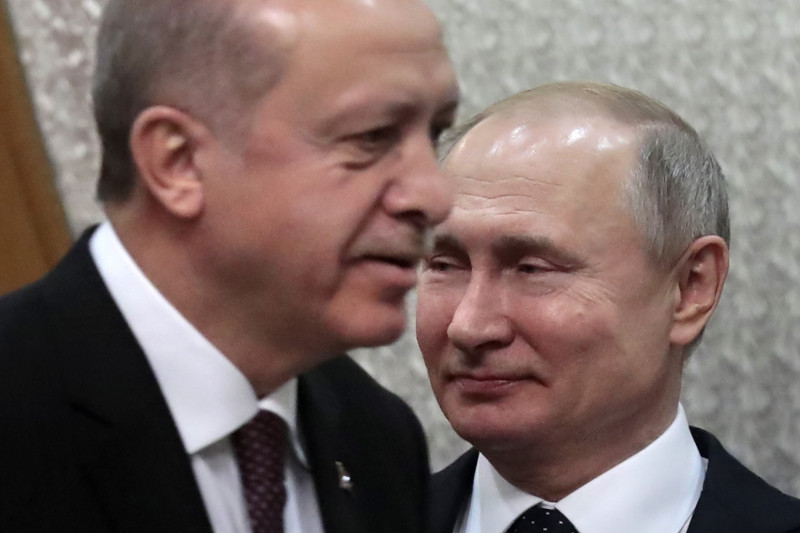Russian President Vladimir Putin meets with his Turkish counterpart Recep Tayyip Erdogan in the Black Sea resort of Sochi on Feb. 14.(SERGEI CHIRIKOV/AFP/GETTY IMAGES)
The Kremlin doesn’t even need fake news to push its agenda on Turkish social media. Because domestic disinformation is rampant, Moscow has managed to infect both sides of the debate.
In recent weeks, Turkey’s long-standing bid to acquire Russian S-400 missile defense systems has received renewed media attention. As Presidents Vladimir Putin and Recep Tayyip Erdogan were meeting in Moscow to recommit to the deal, the Turkish defense minister was in Washington trying to allay NATO fears that the purchase would be a threat to the alliance.
Alongside the high-level diplomatic tug of war between Washington and Moscow over ties with Ankara, another battle in Turkey’s media was infecting the debate over defense relationships with false information. For example, a pro-government newspaper insistedrecently that the S-400 would destroy the outlawed Kurdistan Workers’ Party (PKK), and another outlet asserted that the anti-air systems were ideal for counterinsurgency operations.
The United States and other NATO countries insist that the S-400 jeopardizes NATO’s Integrated Air and Missile Defense architecture. Furthermore, the U.S. Congress and the Pentagon are unanimous in their threat that if Turkey buys the S-400, it will be taken out of the F-35 Joint Strike Fighter program. Recently, most pro-government outlets have begun advocating Turkey’s preference for Russia’s next-generation Su-57 fighters, instead of the F-35s. For example, Turkey’s main news agency published a comparison between the F-35 (which is currently being delivered) and Russia’s Su-57 (currently in flight-testing phase) to make the case that Washington’s threats over F-35 deliveries were futile. Another columnist argued that it was impossible for the United States to make progress on F-35 production without Turkey’s help.
The spread of factually inaccurate opinions such as these is a daily occurrence within Turkey’s heavily corrupted information ecosystem. Turkey is already one of the countries most exposed to fake news, has one of the highest ratios of bot infections in the world, and is also among the countries with lowest resistance to fake digital news
Turkey is already one of the countries most exposed to fake news, has one of the highest ratios of bot infections in the world, and is also among the countries with lowest resistance to fake digital news
, as measured by the Media Literacy Index. Heavy government controls make the media environment more susceptible to information manipulation by removing alternative voices from the online marketplace of ideas. This also makes Turkey one of the most vulnerable countries to organized computational propaganda during international political crises.In such an environment, Russia does not need to launch a coordinated disinformation campaign similar to what it has done in the West. Domestically produced fake and accurate news that is sympathetic to Kremlin views is already rampant. Moscow is thus well positioned to deploy its information warfare to steer policy decisions in its preferred direction. In a hypothetical crisis scenario, where information and time constraints prevent an accurate assessment of the problem at hand, Moscow could push its agenda more directly and quickly.
In a recent study, I mapped the extent of Russian digital information operations in Turkey by combining more than 183 million tweets, with occasional Facebook checks, from 2015 to 2019. The results show that Russia employs a less direct strategy in Turkey compared with other documented cases in the United States, the United Kingdom, France, and Germany. Rather than outright disinformation, pro-Russian accounts engage in what could best be termed as “forced perspective” information operations in Turkey.
Rather than outright disinformation, pro-Russian accounts engage in what could best be termed as “forced perspective” information operations in Turkey.
Domestic pro-Russian accounts and bots in Turkey rarely deploy false information these days and instead use accurate information but distort its meaning and remove its context. In addition, these accounts use timing to their advantage to push a factually accurate narrative in particularly crisis-prone periods to distort the public narrative in favor of Russia.
This not only increases public support for pro-Russian policies (or the acquisition of their weapons systems) but also decreases support for pro-NATO policies. Russia also plays both sides to maximize its influence. It affects mainstream pro-government information networks through its direct influence on the government. At the same time, it hedges by ensuring that Russia’s main Turkish-language outlets, Sputnik Turkiye and RSFM radio, are overwhelmingly pro-opposition. This enables Russia to control the narrative on both the pro-government and the pro-opposition networks.
This wasn’t always the case. Before Russia’s entry into the Syrian civil war, Turkish digital media was largely ambivalent and defensive toward Moscow. The main turning point was Turkey’s shooting down of a Russian Su-24 fighter jet in Syria in November 2015, after which Russian digital information operations spiked in Turkey. Aiming to distract observers from the debate over whether the jet had veered into Turkish airspace, Russian social media accounts instead highlighted the claim that Turkey was selling oil produced from Islamic State-controlled territories
Aiming to distract observers from the debate over whether the jet had veered into Turkish airspace, Russian social media accounts instead highlighted the claim that Turkey was selling oilproduced from Islamic State-controlled territories
in Syria.This narrative became one of the most successful Russian information operations, as it succeeded in not only distracting both Turkey and NATO allies from the fact that a Russian jet had strayed into Turkish airspace but also drove a wedge between Ankara and other NATO capitals over Turkey’s policy toward the Islamic State. Within weeks of the incident, the bulk of international media attention was focused less on whether the Russian jet had strayed into Turkish airspace, or whether Turkey was justified in firing on it, and more on Islamic State-produced oil smuggled into Turkey. This information campaign demonstrated that Moscow could easily single out and isolate Turkey. It was also the starting point of Turkey’s rebalancing away from NATO and toward Russia.
Russia’s information operations in Turkey seemed to disappear almost entirely after the first Putin-Erdogan meeting in St. Petersburg in August 2016—the first meeting after the Su-24 incident. It is difficult to infer the exact details of what was discussed in that meeting from the information released to the media, but my research shows that all Russian allegations related to Islamic State oil completely disappear from Turkish digital media. After the August meeting, Turkish pro-government media networks began assuming a markedly pro-Russian stance, and Turkey started gravitating toward Moscow as part of its rebalancing act on issues related to Syria, energy, and arms sales.
By Akin Unver
Source: FP



